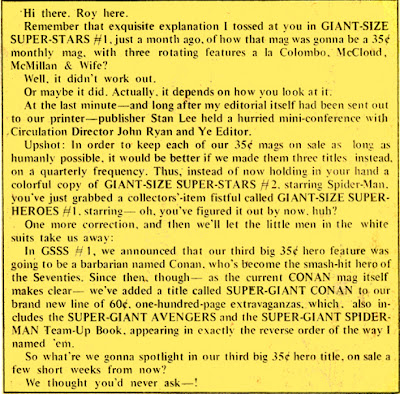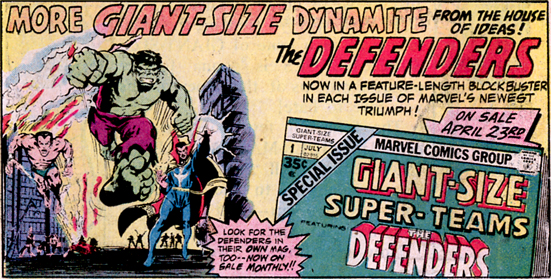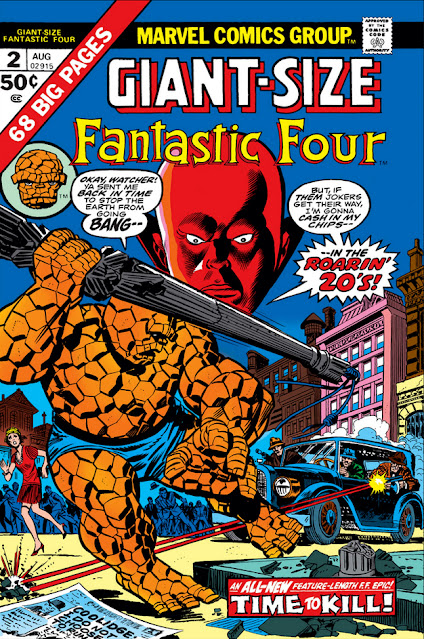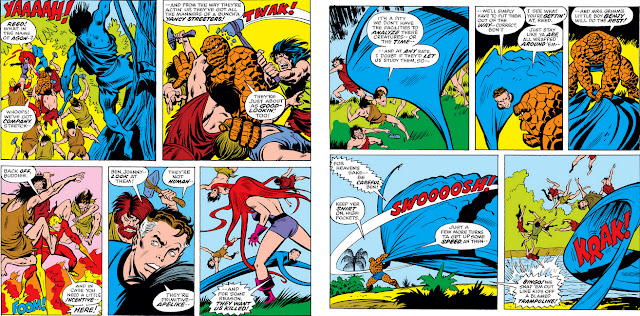In 1974, Marvel's House of Ideas was brimming with them. The company's fan magazine, FOOM, remained a hit, reaching 25,000 members; the first issue of Spidey Super-Stories went on sale; Stan Lee would announce the publication of The Origin of Marvel Comics (a working title which would be tightened up to Origins of Marvel Comics), as well as the release of the first Marvel Superhero Calendar (another working title, becoming The Mighty Marvel Calendar); and perhaps most notably, its ambitious Giant-Size line of books launched, which supplemented a number of regular monthly titles on the stands but with a higher page count and, it goes without saying, a higher price tag.
The Giant-Size books have already received their due in a separate PPC post; but in thumbing through my copy of Giant-Size Fantastic Four #2 recently, I was reminded of how the company's handling of these books see-sawed throughout their production, with ideas being tossed into the air like confetti but lacking in execution, as typified by a full-page notice/advertisement by Editor Roy Thomas:
Unless they saw a very limited release that never hit my town, the SUPER-GIANT 100-page books never saw print (that I know of). Neither did the title which Thomas previewed following his announcement:
Personally I thought a book named Giant-Size Super-Teams had "winner" written all over it, since it would have at least four teams to rotate in addition to having the option to preview a new team idea should anyone come up with one. (Though the ad appears to imply that the new book would exclusively feature the Defenders, instead.) But all of these fruits died on the vine, as did, eventually, the entire line, engulfed by reprinted material when fresh new stories could no longer be supplied.
The second issue of Giant-Size Fantastic Four was already signalling the title's future fate--its "68 Big Pages" amounting to less than half that amount with original material, while ads and a reprint FF story were used to fill the page count. Still, there is the Fantastic Four (with Medusa instead of the Invisible Girl); and there's writer Gerry Conway with artists John Buscema and Chic Stone; and there's the Watcher; and there's time travel; and there's Willie Lumpkin; and there's a brand new foe to contend with.
Though we're not talking about just gangsters giving the FF a hard time.
Testing a new sub-orbital shuttle craft from N.A.S.A., the Fantastic Four* end up in crisis and out of control when a blinding flash erupts and reduces them to literally flying blind, with everyone aboard unable to see the craft's controls. (Our team might have taken a tip from F-18 pilots, who like motorcyclists "dress for the slide, not the ride.") Odds are it was a sense of déjà vu that three of these four people must have experienced following the incident--an aborted flight followed by their ship crashing back to Earth, only to encounter circumstances on their return that were, once again, shocking and unexpected.
*The entire FF, in fact. Unlike the Avengers, the FF feel no need to leave anyone at the Baxter Building in case of an emergency (their robot receptionist didn't appear until 1982), which meant if trouble arose we can only assume a recording plays to tender the team's regrets at being unavailable. We can see why Reed and Ben are needed on a test flight--but maybe it would have been prudent for Johnny and/or Medusa to stay behind and mind the store?
Fortunately for the FF, the Watcher makes a timely appearance to interfere assist, whereupon the team learns that a stealthy, shadowed figure at their own headquarters is responsible for the planetary changes they've witnessed--changes which only the FF, being in orbit (well, sub-orbit if we're being technical) at the time, have any hope of altering.
(No, I don't know how four people, indigenous to Earth, have escaped changes in their planet's timeline simply because they were flying above it. Who's up for a no-prize with an explanation?)
There have been any number of instances where the FF have had to split into teams of two in order to accomplish their objective, whether by accident or by choice--the earliest of course being their very first issue, when Reed and Johnny were separated from Ben and Sue on Monster Isle and subsequently faced the Mole Man on their own. Thanks to the Watcher, who must be the sentimental type, we have the same pairings here (with Medusa in Sue's place), with each pair being sent to repair the damage caused by our Baxter Building intruder's encroachment into the past: Reed and the Torch appear during the time of the American Revolution, where they save Gen. George Washington from execution, and Medusa and the Thing travel back to the 1920s (where Ben finds he's become human), intercepting the intruder as he's divulging information on the stock market.
I'm as surprised as perhaps you are to find that Willie not only seems to have a set of keys to the entire tower of the Baxter Building but also restricted areas which house equipment such as the gateway to the Negative Zone or, in this case, Dr. Doom's time machine. We can only assume at this point that it's his befuddlement that's allowed him to take in such confusing surroundings and people in stride. Fortunately, both FF teams are in and out of their destinations fairly quickly and have managed to mitigate any harm that Willie might have inadvertently done.
Yet instead of returning to their own time, the team is drawn to an altogether different destination and forced to face the instigator of this plan--a being who spends his existence in a lifeless world without change, and has no qualms about what has to be destroyed to bring that existence to an end.
Some of you may remember Tempus from a later issue of Thor, for instance, where he was in the service of Immortus--not exactly a step up for someone who craves change and growth but ends up in Limbo, a place which has been many things to many denizens but by definition exists outside of time. To the FF, however, Tempus is a clear and present danger not only to themselves, but to their world--and where time is concerned, its effects on the team as wielded by Tempus reduce them to near-helplessness**.
**As opposed to Thor, whose immortality allows him to shrug off Tempus's eye beams--nor did Tempus himself fare well against one who has felled more than his share of storm giants.
And yet, the FF are able to rally thanks to the handy paths to victory which Buscema and Conway provide for them and which they're quick to exploit.
Since it's doubtful that George Washington's capture or Willie's "insider trading" disclosures to gangsters would cause such upheavals in time to the extent which Tempus desired, we're left to assume that the time machine would have continued to transport Willie to different points in time where, either by happenstance or interaction, he would further interfere with crucial parts of history--all the while never questioning what was happening to him or why, it seems.
Still, we're shown that for Willie, this was all thought to be a dream, until the Watcher (Motto: "Oath? What oath? Oh that oath...") returns one and all to the Baxter Building and ties up the loose end remaining from this affair--i.e., the aforementioned Willie. (Who we can all agree gets off considerably easier than Leonard Tippit.)






















Never mind how the FF escaped the effects of the changed timeline Comicsfan, what I want to know is how George Washington's capture made the whole world primordial.
ReplyDeleteWouldn't it have made more sense for the FF to have returned to a colonial US still run by the Brits? (Or partly run by them, as they do have a habit of inventing new borders to divide up other peoples' countries...)
And if the Watcher has a super advanced monitor that can recreate recent events, you'd think it would show who entered the FF's hq and used the time machine.
Is that his idea of non-interference? Here guys, this is what happened in detail, right down to where the intruder entered, only... you can't see him. But here's a close up of his foot if that helps.
-sean
Well, sean, it's possible the Watcher was attempting to withhold as much information as possible in regard to the intruder's identity so as to still render enough assistance to the FF for them to have a fighting chance to work it all out and save their world. After all, he probably felt the "who" didn't matter as much as what the end result was going to be. (And if that sounds like I'm grasping at straws, you're probably right. :) Besides, how silly would it have made this story if the Watcher announced up front, to the FF and to us, that this figure was their mailman?)
ReplyDeleteYou're probably right about the Watcher wanting to make the FF put some effort in themselves, Comicsfan. Otherwise, presumably he could just have sent all four of them to the Baxter Building before Willie Lumpkin entered in the first place...
ReplyDelete-sean
Waitaminnit.
ReplyDeleteWho did build that ruined city on the moon? Was it the Kree?
I can't be expected to know everything!
And yes, let's just face it, Uatu was bad at his job.
Not the watching part, he was good at that. It was the shutting-up-about-it part that he was bad at.
M.P.
The Watcher says he'll need to observe Mankind from "a more distant part of the galaxy" now that Man has reached the moon, but did he consider simply moving to Mars? It would be more convenient. And he stayed on the moon anyway!
ReplyDelete(But in FF #98 Neil Armstrong becomes the first man on the moon, completely ignoring the fact that the FF had already been there).
Definitely the Kree, M.P. (See, you do know everything. ;) )
ReplyDeleteColin, as you know, the PPC has already dipped its toes into the "who made it to the moon first" mix-up between those two issues. As I mentioned at the time, I suppose the goal of the latter issue was to celebrate the achievement of the Apollo mission in its own way, albeit arranging for the FF to completely put out of their minds their own historic flight. It remains a head-scratcher, for sure--one which even the letters page for the story managed to deftly sidestep.
The Fantastic Four not keeping someone on "monitor duty" fits with the ongoing riff that they're explorer-adventurers first, then superheroes if the need arises. The whole team goes on crazy experimental trips because shenanigans like what happened this story are all too likely to happen.
ReplyDeleteMarvel history and real life NASA-space race achievements have been an impossible jigsaw to fit together. Don't forget that not only were the FF the first Americans to stand on the Moon, but the Russian Red Ghost might have actually beaten them by a few minutes.
But even if the FF and enemies are keeping their adventures secret, it's hard to ignore SHIELD. As we see in Avengers #96, in the early 70's the government spy agency assembled a huge, beautiful Neal Adams space station in high orbit. Not only a major space station, but they slapped together a starship "that only needed a power source" to make it go. The infrastructure for all that makes the NASA Apollo missions (happening at the same time period) look like something built by talented amateurs in a garage.
I was wondering when somebody was gonna mention the Red Ghost and his Super-Apes!
ReplyDeletePersonally, I did not wanna open that can of worms, or "barrel of monkeys" as the case may be.
Speaking of abandoned (or maybe not abandoned) alien outposts in our solar system, in 2007 the NASA space probe Dawn took pictures of shiny spots on the dwarf planet Ceres. They were mysterious.
I followed it in the news; I was hoping for alien outposts there, but NASA concluded that these areas with a high albedo were basically salt deposits. Brine.
Dang it.
It's believed Ceres has cryovolcanic activity that brings that stuff to the surface.
Of course that suggests liquid water under the surface, and while there may not be any Kree on Ceres, who knows what might lurk down there. Organic life on a simple level? That's a whole different can of space monkeys.
In effect, Ceres WOULD be an alien outpost. Of sorts.
Or it could be the Skrulls.
M.P.
Astronomical Picture of the Day had a spiffy shot of Titan gleaming in the sun.
ReplyDeletehttps://apod.nasa.gov/apod/ap220327.html
This week also featured some news items of slush volcanoes on Pluto
https://www.theguardian.com/science/2022/mar/29/plutos-peaks-are-ice-volcanoes-scientists-conclude
The whole solar system is just a'bubblin'!!
I'm trying to dredge up out of memory the activity of the Marvel Solar System (up to the modern day, not the far future Guardians of the Galaxy planets)
Seems to me there are strange beings in the Sun, but that could wires crossing from other comic book companies.
Nothing comes to mind for Mercury or Venus.
Luna has:
The Kree graduation-test city aka the Blue Area. This has been visited, smashed, inhabited, overgrown by gardens and maybe more.
The Watcher.
The entrance to Other Realm, where Man-Wolf was a godking.
Mars became the site where the Tripod Aliens staged their attack on Earth for War of the Worlds, not their home planet.
Jupiter and its amazing moon system is a surprising blank in my memory.
Saturn has:
Titan, with some history of Eternals becoming the Titans and producing Thanos et al.
Also, one of the moons became the staging-launch site for the Stone Men of Saturn.
Uranus has a convoluted history with Marvel Boy. Some business with another colony of fugitive Eternals (or Deviants?) not co-existing well at all with the really alien gaseous plasmic native Uranians.
And that's all I got without actually doing any research.